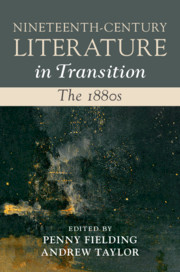Book contents
- Nineteenth-Century Literature in Transition: The 1880s
- Nineteenth-Century Literature in Transition
- Nineteenth-Century Literature in Transition: The 1880s
- Copyright page
- Contents
- Figures
- Contributors
- Acknowledgments
- Introduction: ‘Knowledge Made for Cutting’
- Chapter 1 Mermaids Amongst the Cables: The Abstracted Body and the Telegraphic Touch in the Nineteenth Century
- Chapter 2 Enclosing Forms, Opening Spaces: The 1880s Fixed-Verse Revival
- Chapter 3 ‘The Newest Culte’: Victorian Poetry and the Literary Societies of the 1880s
- Chapter 4 The Time of W.E. Henley: ‘Minor Poetry’ and the 1880s
- Chapter 5 The Evolution of Point of View
- Chapter 6 Network, History, Method: Andrew Lang in and after the 1880s
- Chapter 7 Animated Conversations: Form, Transformation and the Category of the Novel in the 1880s
- Chapter 8 Henry James, Vulgarity and Transatlantic Moderation
- Chapter 9 He and She: The 1880s, Camp Aesthetics and the Literary Magazine
- Chapter 10 Men, Women and Horses: Public Spectacle in 1887
- Chapter 11 The Secular Turn in British Literature of the 1880s
- Index
Chapter 8 - Henry James, Vulgarity and Transatlantic Moderation
Published online by Cambridge University Press: 10 October 2019
- Nineteenth-Century Literature in Transition: The 1880s
- Nineteenth-Century Literature in Transition
- Nineteenth-Century Literature in Transition: The 1880s
- Copyright page
- Contents
- Figures
- Contributors
- Acknowledgments
- Introduction: ‘Knowledge Made for Cutting’
- Chapter 1 Mermaids Amongst the Cables: The Abstracted Body and the Telegraphic Touch in the Nineteenth Century
- Chapter 2 Enclosing Forms, Opening Spaces: The 1880s Fixed-Verse Revival
- Chapter 3 ‘The Newest Culte’: Victorian Poetry and the Literary Societies of the 1880s
- Chapter 4 The Time of W.E. Henley: ‘Minor Poetry’ and the 1880s
- Chapter 5 The Evolution of Point of View
- Chapter 6 Network, History, Method: Andrew Lang in and after the 1880s
- Chapter 7 Animated Conversations: Form, Transformation and the Category of the Novel in the 1880s
- Chapter 8 Henry James, Vulgarity and Transatlantic Moderation
- Chapter 9 He and She: The 1880s, Camp Aesthetics and the Literary Magazine
- Chapter 10 Men, Women and Horses: Public Spectacle in 1887
- Chapter 11 The Secular Turn in British Literature of the 1880s
- Index
Summary
In the 1880s, the New York-based Century Magazine was a regular home for Henry James’s fiction and criticism. His first major intervention on the theory of fiction in the magazine is his July 1883 essay on Anthony Trollope (published over a year before Century printed his now canonical consideration ‘The Art of Fiction’). The essay represents, perhaps unsurprisingly, a highly nuanced view of the literary scene in which allegiances circle and return and reputations are diminished and then rebuilt. Trollope’s posthumously-published autobiography appeared three months after James’s essay and seemed to confirm many of the latter’s anxieties about the business of writing. This chapter explores James’s contorted reading of Trollope as a literary precursor who is both criticised for his immoderate, promiscuous productivity and, at the same time, recuperated as a moderate sensibility standing opposed to the scientific avant-gardism of the French naturalist tradition. By exploring the complex national allegiances of an American author writing in a proudly American journal about a recently-deceased, and highly popular, English novelist, I consider the ways in which James attempts to carve out for himself a transatlantic space where the metaphoric possibilities of moderation and its antonyms find a restless purchase.
- Type
- Chapter
- Information
- Nineteenth-Century Literature in Transition: The 1880s , pp. 157 - 177Publisher: Cambridge University PressPrint publication year: 2019

